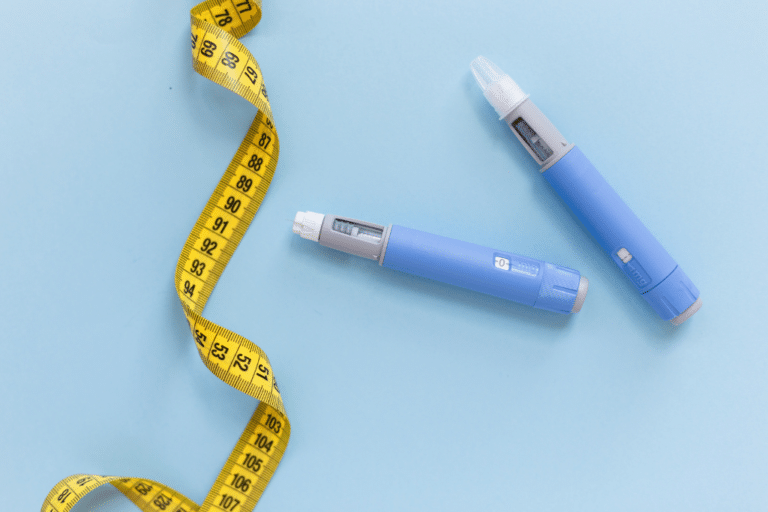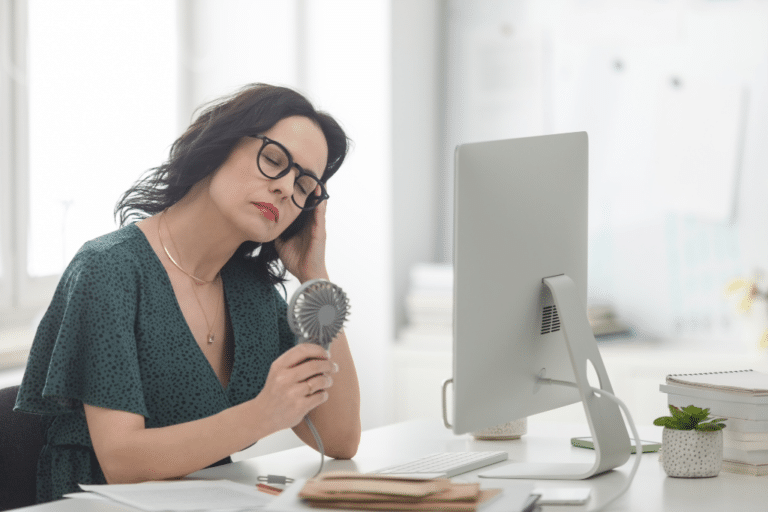If perimenopause is stealing your sleep, it may be tempting to resort to over-the-counter sleep aids (most contain antihistamines) or prescription sleep medications.
But these don’t treat the root cause of insomnia and may lead to dependency. Over time, they work less effectively, which means you need higher and higher doses to do the job. As someone who’s been there and done that, I don’t recommend this approach. Get to the root of the problem.
There are a number of supplements that can be helpful for sleep. Here are a few that you might consider. Before you head to the supplement aisle and start to create your own herbal cocktail, please read my guidance in Chapter 9 of Perimenopause: The Savvy Sister’s Guide to Hormone Harmony and consider consulting with a professional about correct dosages and what core issue you’re hoping to treat.
GABA
Gamma aminobutyric acid (GABA), is the main inhibitory neurotransmitter in your central nervous system; your body’s natural “off” switch. GABA slows nerve activity in your brain, which leads to feelings of calm and relaxation. Research has shown favorable results using GABA supplementation. In one study, an amino acid preparation containing both GABA and 5-HTP, which your body produces from the amino acid tryptophan, reduced time to fall asleep, increased the duration of sleep and improved sleep quality.
Taurine
Taurine is an amino acid that reduces cortisol levels and increases the production of GABA. Try taking 500 mg before bed. Using magnesium taurate allows you to get both magnesium and taurine with a single pill.
Passionflower
Studies suggest that passionflower may be just as effective as synthetic drugs for generalized anxiety disorder (GAD). It’s common to see it combined with other calming herbs such as valerian root and lemon balm, chamomile, hops, kava, and skullcap in herbal sleep blends. Because passionflower may help lower blood pressure, be careful when using this herb with blood pressure medications.
Valerian root
Studies show that valerian reduces the time it takes to fall asleep and improves sleep quality, so if you can’t sleep, it may be just what you’re looking for. Unlike many prescription sleeping pills, valerian has fewer side effects and is a lot less likely to result in morning drowsiness.
Lemon balm
Research is validating the benefits of lemon balm as an anti-anxiety/sleep supplement. A study of brainwaves showed that lemon balm was useful in reducing anxiety. In a separate two to four-week study, taking two doses of 300 mg lemon balm extract helped reduce anxiety by up to 15% to 18% in 20 participants. This same study showed that lemon balm could reduce insomnia by up to 42%.
Adaptogenic herbs
Adaptogens increase the capacity of the body to adapt to stress and increase resistance to disease. They don’t work on a specific body organ but have a “normalizing” effect on imbalances caused by physical or emotional stress. Ashwagandha is an herb that has been shown to increase energy and mental alertness during the day that has also been shown in research to help you sleep better at night. It can be taken alone (400 mg) or in a blend with other adaptogens. If you are sensitive to nightshades, be aware that ashwagandha is in this family.
Magnesium
Magnesium is an essential mineral, one of seven essential macro-minerals that your body needs in large quantities. Unfortunately, the body does not produce magnesium, so it needs to come from outside sources. Magnesium deficiency is common among adults, which leads to restless sleep and waking frequently during the night. I can personally say that magnesium has made a huge difference in my sleep. Maintaining healthy levels of this mineral often leads to deeper, more sound sleep because it helps maintain healthy levels of GABA.
Melatonin
Melatonin is a hormone that tells your body when it is time to head to bed. Melatonin levels start to rise when it is dark outside, signaling your body that it is time to sleep. As melatonin helps your body prepare for sleep, people who don’t make enough of it at night can struggle to fall asleep. It is a popular supplement for sleep. Long-term chronic use can result in a decrease in the body’s natural ability to produce it, so it should be used short-term. I generally recommend starting with 0.5-1 milligram about 30 minutes before bedtime.
Essential oils
The essential oils of certain herbs can work wonders when it comes to de-stressing and getting to sleep. Essential oils of lavender and roman chamomile are popular for their calming properties, but less flowery options like marjoram, cedarwood, and bergamot also offer sleep benefits. Oils can be inhaled, diffused, or used on the bottoms of your feet (dilute in a carrier oil such as almond oil or unfractionated coconut oil). Never take oils internally unless you are working with an aromatherapy specialist.
[bctt tweet=”The essential oils of certain herbs can work wonders when it comes to de-stressing and getting to sleep. #insomnia #hormoneimbalance #perimenopause #menopause #sleepsupplements #magnesium #melatonin #adaptogenicherbs #GABA #passionflower #valerian ” username=”DrAnnaGarrett”]
I get a lot of questions about my own personal “sleep potion”. It includes: 400 mg oral progesterone, 450 mg magnesium taurate at bedtime, two capsules of ACTS (an adaptogen blend), and three capsules of Vital Nutrients Sleep Aide formula (a blend of nervine herbs). What works for me may not work for you, so consider consulting with a professional about what products to try and what core issue you’re hoping to treat.
Dr. Anna Garrett is a menopause expert and Doctor of Pharmacy. She helps women who are struggling with symptoms of perimenopause and menopause find natural hormone balancing solutions so they can rock their mojo through midlife and beyond. Dr. Anna is the author of Perimenopause: The Savvy Sister’s Guide to Hormone Harmony. Order your copy at www.perimenopausebook.com.
Dr. Anna is available for 1-1 consultations. Find out more at www.drannagarrett.com/lets-




